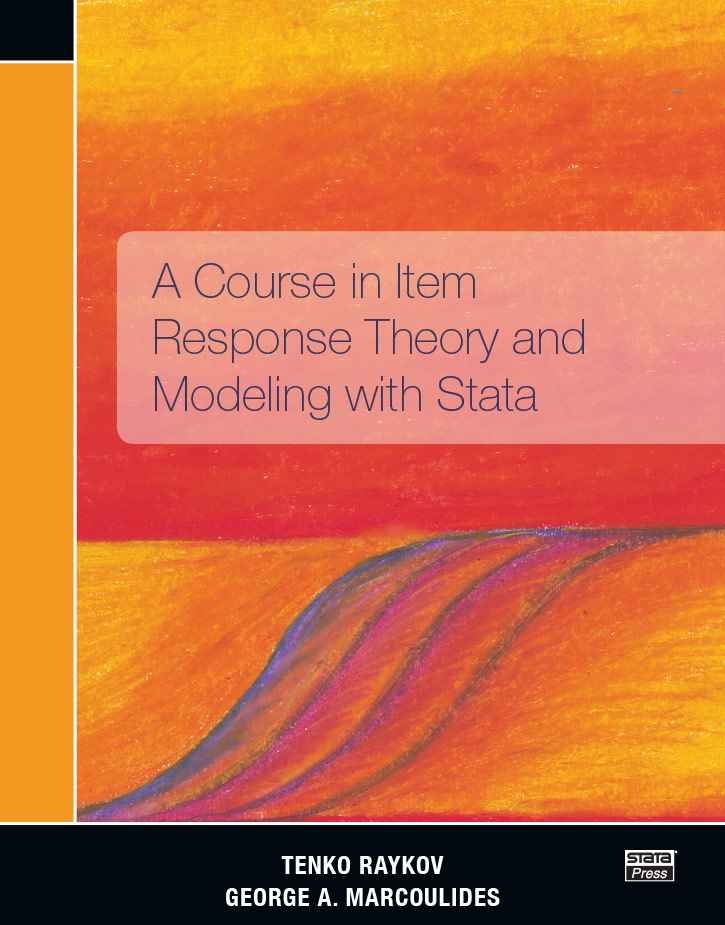
A Course in Item Response Theory and Modeling with Stata |
||||||||||||||||||||||||||||||||||||||
 Click to enlarge See the back cover |
$54.00 Print Buy now$46.00 VitalSource Buy now$41.50 Amazon Kindle Buy from Amazon
As an Amazon Associate, StataCorp earns a small referral credit from
qualifying purchases made from affiliate links on our site.
|
Author index Subject index Errata Download the datasets used in this book Review from the Stata Journal |
||||||||||||||||||||||||||||||||||||
Comment from the Stata technical groupItem response theory (IRT) is used to evaluate the relationship between a latent trait, such as mathematical ability, quality of life, or patient satisfaction, and the test questions or items intended to measure that trait. IRT is especially useful when developing new instruments, when analyzing and scoring data collected from these instruments, and when comparing instruments that measure the same trait. A Course in Item Response Theory and Modeling with Stata, by Tenko Raykov and George A. Marcoulides, is a comprehensive introduction to the concepts of IRT that includes numerous examples using Stata's powerful suite of IRT commands. The authors' development of IRT builds on the foundations of classical test theory, nonlinear factor analysis, and generalized linear models. Using these foundational concepts, the authors then explain IRT models, estimation via maximum likelihood, item characteristic curves, and information functions. The examples demonstrate how to fit many kinds of IRT models, including one-, two-, and three-parameter logistic models for binary items as well as nominal, ordinal, and hybrid models for polytomous items. In addition, the authors provide overviews of instrument construction and differential item functioning. A Course in Item Response Theory and Modeling with Stata is an outstanding text both for those who are new to IRT and for those who are familiar with IRT but are new to fitting these models in Stata. It is a useful text for IRT courses and a good resource for researchers who use IRT. |
||||||||||||||||||||||||||||||||||||||
About the authorsTenko Raykov is Professor of Measurement and Quantitative Methods at Michigan State University. He specializes in latent-variable and structural equation modeling, multivariate statistics, item response theory and modeling, missing data analysis, multilevel modeling, scale construction and development, longitudinal data modeling, survival analysis, and applied statistics. He is on the editorial boards of the quantitative behavioral and social science journals Structural Equation Modeling, Psychological Methods, British Journal of Mathematical and Statistical Psychology, Educational and Psychological Measurement, Journal of Educational and Behavioral Statistics, and Multivariate Behavioral Research. With George A. Marcoulides, he has also published the books A First Course in Structural Equation Modeling (2006), An Introduction to Applied Multivariate Analysis (2008), Introduction to Psychometric Theory (2011), and Basic Statistics: An Introduction with R (2012). George A. Marcoulides is Distinguished Professor of Research Methodology in the Department of Education at The Gervitz Graduate School of Education and a member of the Quantitative Methodology in Social Sciences Program at the University of California, Santa Barbara. His research focuses on various aspects related to computational algorithms, design optimization, and longitudinal modeling; psychometric theory; and structural equation modeling. He is a fellow of the American Educational Research Association, a fellow of the Royal Statistical Society, and a member of the Society of Multivariate Experimental Psychology. He is currently editor of the journals Structural Equation Modeling and Educational and Psychological Measurement and editor of the Quantitative Methodology Book Series and is on the editorial board of numerous other scholarly journals. |
||||||||||||||||||||||||||||||||||||||
Table of contentsView table of contents >> |
||||||||||||||||||||||||||||||||||||||